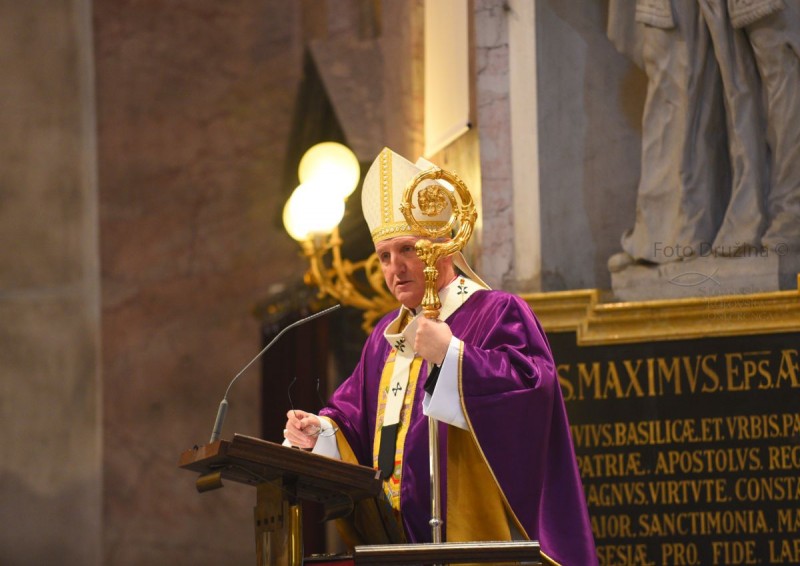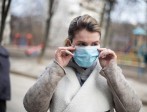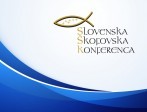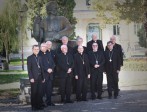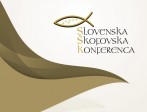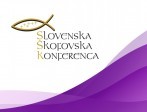Dear brothers and sisters,
With this Holy Mass, we are joining an initiative of the Council of the Bishops' Conferences of Europe that every day in Lent, one of the Bishops' Conferences offer a Holy Mass for the victims of covid-19 who have died since the beginning of the epidemic. In this way, too, we have accepted the invitation of Pope Francis. Last year on March 27, almost exactly a year ago, at the Peter's Square in Rome, he said to the city and to the world: "Thick darkness has gathered over our squares, our streets and our cities; it has taken over our lives, filling everything with a deafening silence and a distressing void, that stops everything as it passes by; we feel it in the air, we notice in people's gestures, their glances give them away. We find ourselves afraid and lost. … We have realized that we are on the same boat, all of us fragile and disoriented, but at the same time important and needed, all of us called to row together, each of us in need of comforting the other. … so we too have realized that we cannot go on thinking of ourselves, but only together can we do this" (Pope Francis).
We too have heard this invitation, inspired by the word of Jesus: "I have told you this so that you might have peace in your hearts because of me. While you are in the world, you will have to suffer. But cheer up! I have defeated the world" (Jn 16: 33). We are aware of the suffering, and we are mindful of the storm that started raging across the world, instantly revealing the emptiness of our belief that we are almost omnipotent, that we can solve all the problems and all the crises of the world. It shattered our illusion of safety provided to us by technology and science. It emptied our mighty words of coexistence and solidarity.
We have experienced that the virus, barely visible through microscopes, has stopped the world with a single swipe – the production, the trade, the tourism, the travelling, as well as schools, universities, theatres and concert halls. It restricted our movement to a region, a municipality, or a few miles from where we live. A certificate was required for a trip. At night in many countries, the movement was or still is illegal. It has severely interfered with the spiritual realm, as churches and shrines remained empty. Priests were alone at the altar, and the faithful accompanied them through the media. Even St. Peter's Square was painfully empty at the Pope's blessing "Urbi et Orbi" in March last year. Only the hospitals were getting fuller, and the medical staff was getting busier – they were on the verge of their limits. And even doctors, educated and trained to treat and save lives, had to acknowledge the limits of their knowledge and abilities. Instead of signing documents on discharge from the hospital, often they had to close the eyes of patients who died there. We are sincerely grateful to them for these corporal works of mercy done on behalf of relatives who could not come to say goodbye to their loved ones. Funeral services were also overworked, failing to bury all the dead quickly enough. We still remember the shocking images from Bergamo.
What happened? We experienced an incredible contradiction. We talked about the world and experienced it as it were a big village. The unlimited travelling made possible because of the standard and means of transportation led us to all corners of the world, to all corners of this planet. Then the virus "decided" that this village would become his. And when he conquered this world village, he almost literally confined us all to our villages, even to our homes. Quickly the world village became just our village.
All of this teaches us humility. It is as Pope Francis said. With this virus, we realized how fragile and disoriented we are. Notions of greatness dissipated like the morning mist. However, this realization of limitation and fragility has helped us know that we are only strong if we are in solidarity. Our strength is in considering the other, the man next to us, caring for them and their good. As the Pope said, "we cannot go on thinking of ourselves, but only together, can we do this."
As we remember today, with our brothers and sisters from all over Europe, all those who have died from the virus, a shocking thought strikes me: how close death can be to us and how far at the same time. Our brothers and sisters were dying behind the hospitals' walls in front of which we went to pray, and we hoped that the door might open anyway and we would be able to go to the deathbed of our loved ones. And even though there was only a door between them and us, they remained unspeakably far away. They were dying alone. How painful.
However, I think the pain of those who mourn today for their parents, relatives, and friends who said goodbye is greater than the pain of dying. The pain of dying ceases with death, and the pain of mourning only then flares up and lingers. Sharp, burning, seemingly almost permanent. And the pain of saying goodbye is harder for those who are there for somebody than for those who face this "servant of God", as a Slovenian song says. Being there for somebody; without being able to do anything. Be fully aware of what is happening and at the same time unable to do anything. Before us, especially towards the end of this Lent, we see Jesus dying on the cross, and under the cross, his Mother Mary dying with him. We attribute to her the words from the Lamentations, where the prophet asks, "No passerby even cares. Why doesn't someone notice my terrible sufferings" (Lm 1: 12)?
The words of St. Edith Stein speak to me, "We also have to learn to see others carry their cross, and we cannot take it away from them. It is harder than carrying your own, but we cannot avoid it either."
Suffering and dying hurt, but it hurts, even more, our inability to take away suffering and dying. That is why it is precious to look up in these moments. We will see Jesus on the cross, who, like a bronze serpent on its way through the wilderness, is set to heal and live for those who are stung: "And the Son of Man must be lifted up, just as that metal snake was lifted up by Moses in the desert" (Jn 3: 14).
To look up. Even at this time, to look up. Above this world of pandemic, disease, dying, and helplessness, the cross of Jesus Christ still stands, telling us that "God loved the people of this world so much that he gave his only Son so that everyone who has faith in him will have eternal life and never really die" (Jn 3: 16).
As long as our gaze remains lowered to the ground, as long as we do not raise it, we remain trapped in a whirlpool of sickness, pain, death, and helplessness. As we raise it to the cross of Jesus Christ, we can hear His word, "If any of you want to be my followers, you must forget about yourself. You must take up your cross and follow me" (Mk 8: 34).
In this hour of prayer and supplication for all those who have died in the last year and met their Saviour, we must hear the comforting words of the Lord Jesus, "I have told you this, so that you might have peace in your hearts because of me. While you are in the world, you will have to suffer. But cheer up! I have defeated the world" (Jn 16: 33).
His victory is final. "Death has lost the battle! Where is its victory? Where is its sting?'… But thank God for letting our Lord Jesus Christ give us the victory. My dear friends, stand firm and don't be shaken. Always keep busy working for the Lord. You know that everything you do for him is worthwhile" (1 Cor 15: 54-58)!
This year, during the Easter Vigil, the Easter candle will burn again and spread its flame to all who will be eager for it. This year, the alleluia will be heard again announcing Christ's victory over death on Easter morning. It will resound over the graves excavated this year; it will resonate over the tears that have been shed this year. May it strengthen our faith and ignite our love so that we shall receive resurrection and life with the Lord from grief and distress. Amen.
Mons. Stanislav Zore
Metropolitan Archbishop of Ljubljana and
President of SBC

